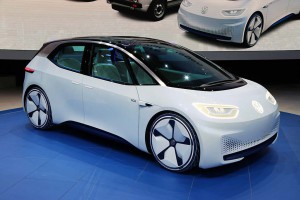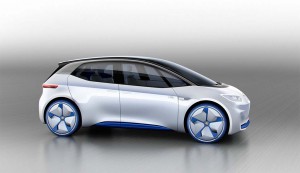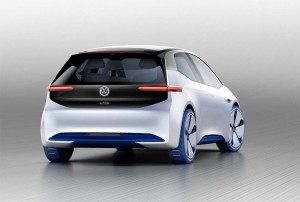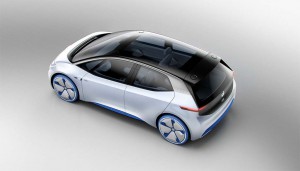(This story has been updated from the official Paris Motor Show launch.)
Volkswagen appears to have clearly identified a problem – and come up with a solution. With its reputation for building clean, high-mileage diesels in tatters due to its emissions scandal – and with regulators around the world pushing for a shift to zero-emissions alternatives – it is planning a major push into battery-electric technology.
The German maker is offering up a look at the first at what it says will be 30 battery-based models scheduled to reach market during the next decade: the new Volkswagen I.D. This Golf-size EV will likely give some serious competition to the likes of the Tesla Model 3 and the Chevrolet Bolt when it reaches market in 2020.
The VW I.D. pushes the concept of long range to a new level, the maker suggesting it will run anywhere from 400 to 600 kilometers – 250 to 375 miles – per charge. That would mean even a motorist could travel even longer than with most of today’s gasoline vehicles on a full tank.
“The I.D. stands for a new era of electric cars,” declared VW brand chief Herbert Diess, during the Paris unveiling.
For the moment, the Volkswagen I.D. is being billed as a “design concept,” though the prototype debuting in Paris is expected to be relatively close to the compact battery-electric vehicle, or BEV, that will hit the road in less than four years.
Perhaps lifting a cue from Apple, the embattled German automaker is using the concept vehicle as the foundation for a new marketing campaign with the tagline, “Think New.” According to the maker, the I.D. itself can be seen as an “iconic design study with the potential to define history.”
(VW hints at design of upcoming EV ahead of Paris debut. For more, Click Here.)
What’s become increasingly clear to industry planners is that even if the vast majority of buyers in the U.S. and Europe could meet their daily driving needs with 100 miles – or less – of range battery-cars won’t truly become competitive until they offer twice that distance per charge.
Though a number of details have yet to be released, the 250 to 375 mile range figures VW quotes suggests it will offer buyers optional lithium-ion battery packs, much as Tesla plans to do with the Model 3 – which will deliver just over 200 miles per charge in its base form.
The good news for automotive engineers and buyers alike is that lithium batteries are becoming smaller and lighter while also packing in more energy. The I.D., in base form, will use a 125 kilowatt-pack, about 25% larger than the one offered in the new Tesla Model S P100d.
That’s a lot of battery and likely couldn’t fit into a conventional compact vehicle without gobbling up the entire passenger and cargo space. But VW is opting for a design similar to what Tesla and Chevy are doing, packaging the batteries below occupants.
(Click Here for details about VW moving away from diesels.)
So, though similar in size to the VW Golf, I.D. will be based on an entirely new platform, dubbed the Modular Electric Drive Kit, or MEB in German shorthand.
Visually, the new BEV will stand out with a distinctive design that will emphasize its power source, including an essentially grille-less nose. It will also offer unique, energy-saving LED head and taillights.
By eliminating the big internal combustion system and moving key components of the battery drivetrain beneath occupants and cargo, VW developers will be able to make much better use of the cabin, the maker notes, adding that, “I.D. has an interior that offers an entirely new spatial experience with the Open Space” design concept.
According to Diess, the five-seat, Golf-sized model will offer the interior space of a much larger VW Passat
But beyond the electric drivetrain, the new I.D. show car hints at a number of other interesting concepts:
- It allows a delivery service access to its cargo compartment to drop off packages if the driver isn’t available;
- The steering wheel can fully retract into the instrument panel and the VW I.D. can shift to fully autonomous mode;
- While that feature won’t be available at the 2020 launch, VW hopes to have a fully self-driving version of the I.D. on the market five years later.
(To see more about VW’s plans for an affordable, 300-plus mile EV, Click Here.)
The new I.D. could, indeed, rewrite Volkswagen history. The maker expects to be selling as many as 1 million electric vehicles by 2025.





Just a few thoughts here… While I’m thrilled with the idea of electric vehicles (no, really!), beyond simple battery storage capacity, there is a the very real issue of CHARGING that beast.
Without a standardized ‘supercharging’ infrastructure, this means you charge it at home. Provided, of course, that you HAVE a home in which you can add a 480 Volt charging station… Because that’s what you’ll need in order to charge a battery of this size overnight. And again, this is assuming that the I.D. will take a 480V connection.
While the Bolt supports ‘fast charging DC’, it doesn’t support Tesla’s 480V ‘Supercharging’. So even with ‘only’ a 200 mile range, it will take 9 hours at 240V to charge. What will a car like the I.D. need to fill it’s battery to capacity?